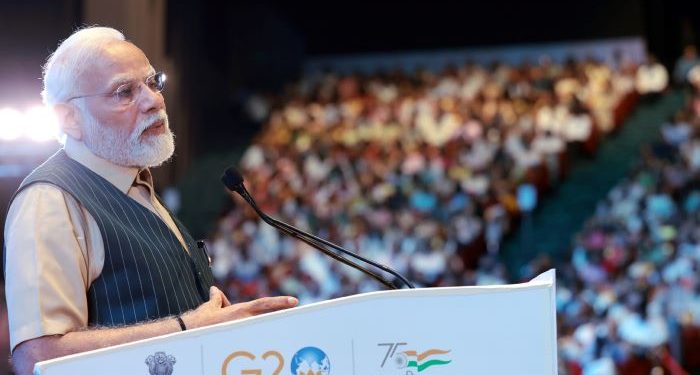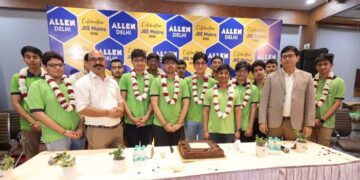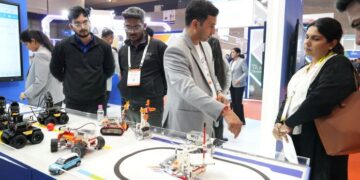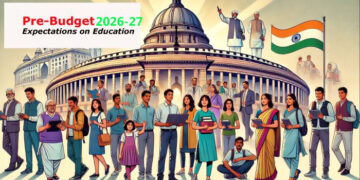By Autar Nehru
Prime Minister Narendra Modi must be credited with tinkering the long-standing education philosophy and norm in India with the objective of shaking it up to set about an education revolution of big implications. As fundamentally, all changes in the initial phase are essentially chaotic and become orderly only after some distance has been covered by the change, the same trajectory can be said to apply for the new education paradiagm.
In this backdrop, looking at the just concluded Akhil Bhartiya Shiksha Samagam (ABSS) on July 29-30 and coinciding with the third anniversary of NEP 2020, one can actually feel this essence and how relevant such an event is going to be in the proposed changes to education sector on the basis of NEP 2020. The grossly inadequate two days allocated to what the Education Minister, Dharmendra Pradhan, called as the ‘Mahakumbh’ of Education & skills, ABSS, in a way was the curtain raiser for things to come.
The tall order of agenda items for discussions, deliberations and showcases and other fixture on the sidelines bore the trademark ‘good intentions’ if not time and space. But nevertheless, the very idea of having an ABSS is laudable and a much-needed big national educational event poised to get better with time and eventually establish itself as a prestigious education fest and forum of international repute.
This time, the ABSS organized by the union ministries of Education and Skill Development and Entrepreneurship, the second ABSS like the first in Varanasi last year was address by PM Modi. It is increasingly emerging that the Prime Minister is taking a lot of personal interest in the new education agenda, and many would believe he is even piloting it. The changes and messaging sought through the new thinking into education are simply far reaching and will test the present education systems operating within the country.
The Prime Minister said that we have to create an energetic new generation in the next 25 years of Amrit Kaal. A generation free from the mentality of slavery, eager for innovations and ready to bring laurels in fields from science to sports, willing to skill themselves as per the needs of the 21st century, a generation filled with a sense of duty. “NEP will play a big role in this”, he said. So, that is the central theme of the push from the Prime Minister.
He emphasized that the biggest injustice to any student is judging them based on their language instead of their capabilities. He lamented that even though India has an array of established languages, they were presented as a sign of backwardness, and those who could not speak English were neglected and their talents were not recognised. As a result, the Prime Minister said, the children of the rural areas remained most affected. He emphasized that the country has now begun to shun this belief with the advent of the National Educational Policy. “Even at the UN, I speak in Indian language.” “Education in the mother tongue is initiating a new form of justice for the students in India. It is also a very significant step towards social justice.”
The Prime Minister underlined that subjects ranging from social science to engineering will now be taught in Indian languages. “When the students are confident in a language, their skills and talent will emerge without any restrictions”, Modi said. He also pointed out that those who try to politicize language for their own selfish interests will now have to shut their shops. “National Educational Policy will give due respect and credit to every language in the country”, he said.
Adding that any reform requires courage, and the presence of courage leads to the birth of new possibilities Modi said the world is looking at India as a nursery of new possibilities. Recalling the vast canvas to be covered at the time of the inauguration of the NEP, the Prime Minister praised the dedication and willingness to embrace new concepts of all the stakeholders.
He said that in NEP traditional knowledge and futuristic technologies have been given the same importance. He mentioned the hard work of the stakeholders from the world of education for the new curriculum in primary education, books in regional languages, for higher education and for strengthening the research ecosystem in the country. Prime Minister threw light on Atal Tinkering Labs where more than 75 lakh students are learning about science and innovation. “Science is simplifying itself for everyone. It is these young scientists that will shape the future of the country by leading significant projects and turn India into a research hub of the world”, he said.
While the release of the first installment of funds under the PM SHRI Scheme for 6207 schools (model cum leader schools for NEP) @630 crore Rupees and text books translated into 12 Indian languages were part his engagements at the event, he also used the opportunity to make a statement on the internationalization of Indian education. He said the presence of Indian HEIs is increasing in all the global rankings and two IIT campuses are opening up in Zanzibar and Abu Dhabi. “Many other countries are also urging us to open IIT campuses in their own countries”, he said. He also touched upon many global universities willing to open their campuses in India due to the positive changes coming in the education ecosystem. He informed that two Australian universities are about to open their campuses in Gujarat’s GIFT City.
So, it is clear that ABSS did become a platform for Government and its central institutions to showcase and share the NEP 2020 implementation and to this end served the purpose of a limited review by these organs. Apart from limited PR, the serious issues, challenges and success stories still remain wrapped in minds of stakeholders. The 16 sessions at ABSS need to become 16 conferences for this to come out.
To conclude as said above, the initial chaos is part of the evolution and ABSS hopefully will grow in all dimensions in celebration of education and its critique as well.













